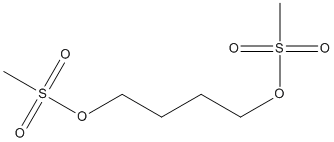
Busulfan is a cell cycle non-specific alkylating antineoplastic agent, in the class of alkyl sulfonates. Its chemical designation is 1,4-butanediol dimethanesulfonate. Its main uses are in bone marrow transplantation, especially in chronic myelogenous leukemia (CML), where it is used as a conditioning drug. Busulfan can control tumor burden but cannot prevent transformation or correct cytogenic abnormalities. Though not as common, it may also be used for chronic lymphocytic leukemia (CLL).
| Molecular Weight | 246.3 |
| Formula | C6H14O6S2 |
| CAS Number | 55-98-1 |
| Solubility (25°C) | DMSO 45 mg/mL |
| Storage |
Powder -20°C 3 years ; 4°C 2 years In solvent -80°C 6 months ; -20°C 1 month |
| Species | Mouse | Rat | Rabbit | Guinea pig | Hamster | Dog |
| Weight (kg) | 0.02 | 0.15 | 1.8 | 0.4 | 0.08 | 10 |
| Body Surface Area (m2) | 0.007 | 0.025 | 0.15 | 0.05 | 0.02 | 0.5 |
| Km factor | 3 | 6 | 12 | 8 | 5 | 20 |
| Animal A (mg/kg) = Animal B (mg/kg) multiplied by | Animal B Km |
| Animal A Km |
For example, to modify the dose of Compound A used for a mouse (20 mg/kg) to a dose based on the BSA for a rat, multiply 20 mg/kg by the Km factor for a mouse and then divide by the Km factor for a rat. This calculation results in a rat equivalent dose for Compound A of 10 mg/kg.
| Related DNA Alkylator/Crosslinker Products |
|---|
| LP-284
LP-284 is a potent DNA alkylating agent that kills solid tumours. LP-284 can be used in the studies of hematologic cancers with compromised DNA repair, such as mantle cell lymphoma (MCL). |
| 4-Hydroperoxy cyclophosphamide
4-Hydroperoxy cyclophosphamide, the active metabolite form of the precursor Cyclophosphamide, cross-links DNA and induces T-cell apoptosis independent of caspase receptor activation, as well as activating the mitochondrial death pathway through the generation of reactive oxygen species (ROS). It can be used in studies related to rheumatoid arthritis and autoimmune diseases. |
| Diaziquone
Diaziquone is a water-soluble synthetic aziridinyl benzoquinone that selectively alkylates and cross-links DNA, inhibits DNA replication, induces apoptosis, and inhibits the proliferation of tumor cells, with potential antitumor activity. |
| Semustine
Semustine is a methylated derivative of Carmustine and also a DNA alkylating agent, which can form covalent bonds with nucleophilic centers in DNA, causing depurination, base pair miscoding, strand breaks, and DNA-DNA cross-linking, and has antitumor activity. |
| Methyl methanesulfonate
Methyl methanesulfonate is a SN2-type alkylating agent that primarily methylates the nitrogen atom in purines and has apoptosis-inducing effects. |


Products are for research use only. Not for human use. We do not sell to patients.
© Copyright 2010-2023 AbMole BioScience. All Rights Reserved.
